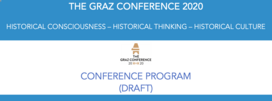Freitag, 13. November 2020
09:30 – 10:30 h Section VII: Impact of the Digital Revolution I
Chair: NN
- Didactics of immersion: Historical culture in the digital Age: Wulf Kansteiner (Aarhus Univ.)
- Promoting historical thinking and citizenship education by using online tools: Steven Stegers (Euroclio)
- Developing historical thinking with the use of videogames. Teaching practices in secondary schools: Marc-André Ethier / David Lefrancois (Univ. Montreal)
- How do youth discuss history in social media? Historical thinking, conflict and debate: Everando Perez-Manjarrez (Harvard GSE)
Break
10:45 – 11:45 h Section VII: Impact of the Digital Revolution II
Chair: Alison Kitson
- Digital revolution and history education: From theory to practice and backwards: Peter Gautschi (PH Luzern)
- The complexities of educating young people about the differences between ‘good and bad history’: Terry Haydn (Univ. of East Anglia)
- Taking mediality seriosly: Using dynamic literacy in inquiry-based learning: Vojtech Ripka (Inst. for The Study of Totalitarian Regimes, Prague)
11:45 – 12:30 h Panel Discussion: Impact of the digital revolution: New and open questions, challenges for the near future
12:30 – 14:00 h Parallel Sessions II: Workshops and Poster Presentations
12:30 – 13:10 h Workshop III More than history? How shall we successfully promote the idea of historical thinking among teachers?
Break
| 12:30 – 14:00 h Poster Q&A Session II Chair: Bettina Paireder
|
14:00 – 15:00 h Section IV: Historical Learning I
Chair: Andreas Körber
- Historical learning as seen by teacher trainees - pre-conceptions and changes: Joanna Wojdon (Univ. of Wrocłav)
- Implementing historical competences in teaching – challenges and obstacles: Jens Aage Poulsen (Univ. College Lillebaelt)
- (Re)Interpretations of the 1916 Irish Easter Rising in 1966, 1991 and 2016. An intercultural comparison to (re)interpretations of the 1956 Hungarian uprising in 1966, 1989 and 2016: Júlia Réka Fodor (Károli Gáspár Univ. Budapest)
15:00 – 15:30 h Panel Discussion: Historical Learning: New and open questions, challenges for the near future
Break
15:45 – 16:45 h Section IV: Historical Learning II
Chair: Carla van Boxtel
- The effects of a reading-to-write instruction in history education: Johan van Driel (Univ. of Amsterdam)
- School students‘ narrative competence and beyond: A Swiss-German reading and writing intervention at upper secondary school level:
- Martin Nitsche / Kristine Gollin / Monika Waldis / Philipp Marti (FHNW School of Education)
- Comparative Analysis of the Hungarian and English Curricula: Józef Kaposi / Richard Fodor (Petro Pázmány Catholic Univ. Budapest)
- Voices and values which shaped the Romanian curriculum. The case of historical thinking in the history curriculum: Carol Capita (Univ. of Bucharest)
16:45 – 17:30 h Panel Discussion: Historical Learning: New and open questions, challenges for the near future
Break
18:00 – 19:00 h Section VI: Theory of History – Theory of History Didactics I
Chair: Isabel Barca
- The „Historical Class” and the reconstructive didactics of history: Maria Auxiliadora Moreira dos Santos Schmidt (Univ. Federal do Paraná-Brasil)
- “Historical Class”. Implementation in curriculum and school practices: Rosi Terezinha Ferrarini Gevaerd (Faculdade São Braz, Curitiba)
- Historical Learning with various media. The perspective of intercultural and humanist didactics of history: Marcelo Fronza (Univ. Federal de Mato Grosso-Brasil)
19:00 – 19:30 h Panel Discussion: Theoretical Developments: New and open questions, challenges for the near future
Kontakt
Alois Ecker
Institut für Geschichte
Heinrichstraße 26/VI
8010 Graz
Institut für Geschichte
Heinrichstraße 26/VI
8010 Graz
Benjamin Ecker
Institut für Geschichte
Heinrichstraße 26/II
8010 Graz
KONFERENZBÜRO
grazconference2020(at)uni-graz.at
+43 699 19221739
Bettina Paireder
Alois Ecker
Benjamin Ecker



